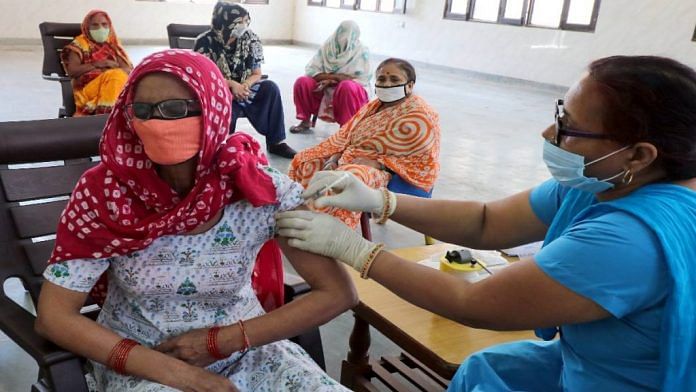New Delhi: Niti Aayog member (health) Vinod Kumar Paul, who chairs the National Expert Group on Vaccine Administration for Covid-19 (NEGVAC), released a public statement Thursday where he seeks to address seven “myths” associated with India’s vaccination programme.
The statement follows criticism lobbed at the Modi government over issues such as vaccine shortage and the struggles being faced by some states in sourcing vaccines from foreign companies.
The “myths” listed by Paul include the central government “not doing enough to ramp up domestic production of vaccines”, and its alleged abdication of responsibility towards states.
“These myths are arising due to distorted statements, half truths and blatant lies,” Paul said in the statement.
Also Read: Mamata and KCR are the only CMs yet to receive even one shot of Covid vaccine
Responsibility towards states
Weighing in on the allegation that the central government “abdicated” its responsibility towards states, Paul cited the liberalised vaccination procurement framework issued last month.
Under the framework, vaccine manufacturers have to provide 50 per cent of their doses to the central government, with the remaining 50 per cent accessible directly to states and private hospitals. States are entitled to approach foreign manufacturers directly for vaccine doses.
“Health is a state subject & the liberalised vaccine policy was a result of the incessant requests being made by the states to give states more power,” Paul said. “The fact that global tenders have not given any results only reaffirms what we have been telling the states from day one: that vaccines are in short supply in the world and it is not easy to procure them at short notice.”
The Government of India, it added, has “merely enabled states to try procuring vaccines on their own, on their explicit requests”.
Referring to a related “myth”, that the “Centre is not giving enough vaccines to the states”, he added, in the “non-GoI channel, states are getting 25 per cent of the doses and private hospitals are getting 25 per cent doses”.
“However, the hiccups and issues faced by the people in the administration of these 25 per cent doses by the states leave a lot to be desired,” Paul said.
“The behaviour of some of our leaders, who in spite of full knowledge of the facts on vaccine supply, appear on TV daily and create panic among the people is very unfortunate. This is not the time to play politics. We need everyone to unite in this fight,” it read.
Compulsory licensing
Another “myth” tackled is that the “Centre should invoke compulsory licensing”. Compulsory licences are authorisations given to a third party by the Drugs Controller General of India to make, use or sell a particular product or use a particular process that has been patented, without the need of the permission of the patent owner. According to Paul, compulsory licensing is not the “formula” to increase vaccine production. “Active partnership, training of human resources, sourcing of raw materials and highest levels of bio-safety labs” is the need of the hour, he said.
“Think about this: Moderna (US company) had said in October 2020 that it will not sue any company which makes its vaccines, but still not one company has done it, which shows licensing is the least of the issues. If vaccine-making was so easy, why would even the developed world be so short of vaccine doses?” he added.
Transfer of tech, he said, is a key that largely remains in the hands of the company that conducted the research and development. However, to emphasise that the government has accelerated vaccine production, he added, “…We have gone one step ahead of compulsory licensing and are ensuring active partnership between Bharat Biotech & 3 other entities to enhance production of Covaxin.”
‘Limitations’
In reference to another claim about the central government not doing enough to buy vaccines from abroad, Paul said the administration has held several rounds of discussions with foreign companies Pfizer, Johnson & Johnson, and Moderna.
“We need to understand that buying vaccines internationally is not similar to buying ‘off the shelf’ items. Vaccines are in limited supply globally, and companies have their own priorities, game-plans and compulsions in allocating finite stocks. They also give preference to countries of their origin just as our own vaccine makers have done unhesitatingly for us,” he said.
On the government “not approving globally available vaccines”, Paul said the central government “proactively eased entry of vaccines approved by US FDA, EMA, UK’s MHRA and Japan’s PMDA, and WHO’s Emergency Use Listing into India in April”.
“These vaccines will not need to undergo prior bridging trials. The provision has now been further amended to waive off the trial requirement altogether for the well-established vaccines manufactured in other countries,” he added.
About allegations that the central government is not taking any step to vaccinate children, Paul said “as of now, no country in the world is giving vaccines to children”.
“Also, WHO has no recommendation on vaccinating children. There have been studies about safety of vaccines in children, which have been encouraging. Trials in children in India are also going to begin soon,” he added.
Contrary to Paul’s claims, vaccination for children has begun in some countries. In the US, 600,000 children aged between 12 and 15 years have already been vaccinated.
(Edited by Sunanda Ranjan)
Also Read: SII begins manufacturing, stockpiling 2nd Covid vaccine Covovax after Modi govt nod



